Unit 8 Knowledge and wisdom知识与智慧
Unit8KnowledgeandWisdom课文翻译综合教程三
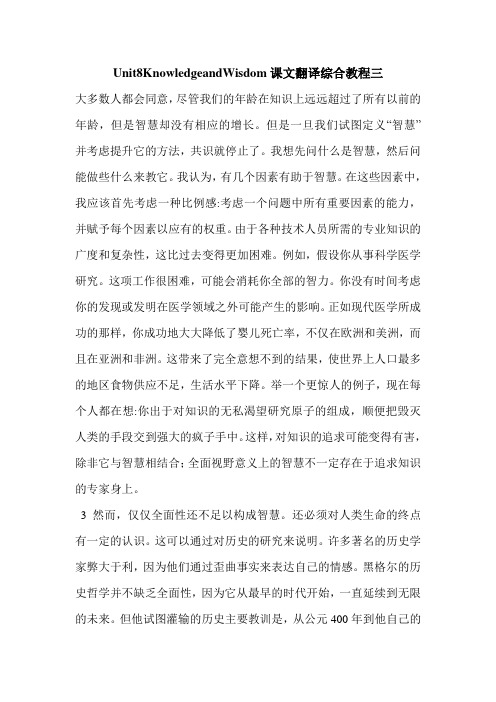
Unit8KnowledgeandWisdom课文翻译综合教程三大多数人都会同意,尽管我们的年龄在知识上远远超过了所有以前的年龄,但是智慧却没有相应的增长。
但是一旦我们试图定义“智慧”并考虑提升它的方法,共识就停止了。
我想先问什么是智慧,然后问能做些什么来教它。
我认为,有几个因素有助于智慧。
在这些因素中,我应该首先考虑一种比例感:考虑一个问题中所有重要因素的能力,并赋予每个因素以应有的权重。
由于各种技术人员所需的专业知识的广度和复杂性,这比过去变得更加困难。
例如,假设你从事科学医学研究。
这项工作很困难,可能会消耗你全部的智力。
你没有时间考虑你的发现或发明在医学领域之外可能产生的影响。
正如现代医学所成功的那样,你成功地大大降低了婴儿死亡率,不仅在欧洲和美洲,而且在亚洲和非洲。
这带来了完全意想不到的结果,使世界上人口最多的地区食物供应不足,生活水平下降。
举一个更惊人的例子,现在每个人都在想:你出于对知识的无私渴望研究原子的组成,顺便把毁灭人类的手段交到强大的疯子手中。
这样,对知识的追求可能变得有害,除非它与智慧相结合;全面视野意义上的智慧不一定存在于追求知识的专家身上。
3然而,仅仅全面性还不足以构成智慧。
还必须对人类生命的终点有一定的认识。
这可以通过对历史的研究来说明。
许多著名的历史学家弊大于利,因为他们通过歪曲事实来表达自己的情感。
黑格尔的历史哲学并不缺乏全面性,因为它从最早的时代开始,一直延续到无限的未来。
但他试图灌输的历史主要教训是,从公元400年到他自己的时代,德国一直是世界上最重要的国家和进步的旗手。
也许可以把构成9智慧的全面性扩展到不仅包括智力,还包括感觉。
发现知识渊博但感情狭隘的人绝非罕见。
这些人缺乏我所说的智慧。
不仅在公共场合,在私人生活中同样需要智慧。
在选择要追求的目标和从个人偏见中解放出来时,这是需要的。
即使是一个如果可以实现就不值得追求的目标,如果它本来就不可能实现,也可能不明智地追求。
Unit 8 Knowledge and Wisdom课文翻译综合教程三
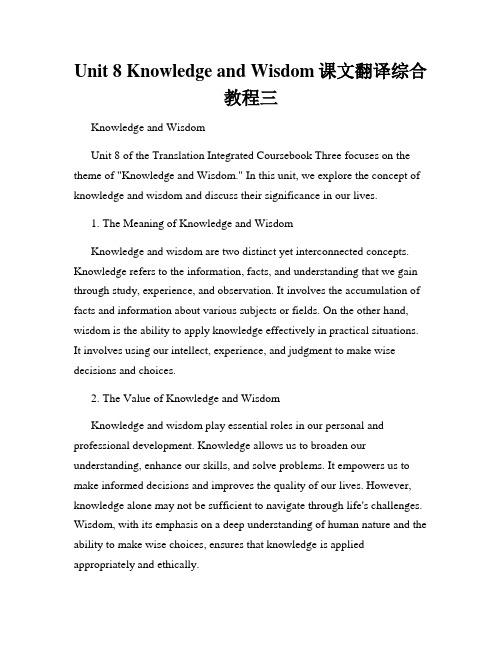
Unit 8 Knowledge and Wisdom课文翻译综合教程三Knowledge and WisdomUnit 8 of the Translation Integrated Coursebook Three focuses on the theme of "Knowledge and Wisdom." In this unit, we explore the concept of knowledge and wisdom and discuss their significance in our lives.1. The Meaning of Knowledge and WisdomKnowledge and wisdom are two distinct yet interconnected concepts. Knowledge refers to the information, facts, and understanding that we gain through study, experience, and observation. It involves the accumulation of facts and information about various subjects or fields. On the other hand, wisdom is the ability to apply knowledge effectively in practical situations. It involves using our intellect, experience, and judgment to make wise decisions and choices.2. The Value of Knowledge and WisdomKnowledge and wisdom play essential roles in our personal and professional development. Knowledge allows us to broaden our understanding, enhance our skills, and solve problems. It empowers us to make informed decisions and improves the quality of our lives. However, knowledge alone may not be sufficient to navigate through life's challenges. Wisdom, with its emphasis on a deep understanding of human nature and the ability to make wise choices, ensures that knowledge is applied appropriately and ethically.Throughout history, humans have demonstrated a relentless pursuit of knowledge and wisdom. From ancient philosophers to modern scientists, the thirst for knowledge has led to significant discoveries and breakthroughs. This pursuit involves continuous learning, questioning, and seeking new perspectives. It also necessitates critical thinking and the ability to discern accurate information from falsehoods. Wisdom, in contrast, is acquired through experience and reflection. It requires self-awareness, empathy, and an ability to recognize patterns and anticipate outcomes.4. Knowledge and Wisdom in Different FieldsKnowledge and wisdom are applicable in various disciplines and areas of life. In academia, knowledge is acquired through rigorous study and research, while wisdom is developed through critical thinking and application of knowledge. In professions such as medicine and engineering, both knowledge and wisdom are crucial for making informed decisions and solving complex problems. In personal relationships, wisdom helps us navigate emotional dynamics and make sound judgments.5. Cultivating Knowledge and WisdomCultivating knowledge and wisdom is an ongoing process that requires dedication and effort. It starts with a thirst for learning and a commitment to continuous self-improvement. Reading books, attending seminars, and engaging in intellectual discussions can expand our knowledge base. Additionally, wisdom can be developed by reflecting on past experiences, seeking guidance from mentors, and practicing empathy and self-awareness.The acquisition and application of knowledge and wisdom have transformative effects on individuals and societies. Knowledge has driven technological advancements, scientific breakthroughs, and societal progress. It has the potential to improve our standard of living, promote equality, and advance global development. Wisdom, with its emphasis on ethical decision-making, can lead to more harmonious relationships, effective leadership, and sustainable solutions to complex problems.In conclusion, knowledge and wisdom are essential for personal and societal growth. While knowledge provides us with information and understanding, wisdom allows us to apply that knowledge effectively and ethically. The pursuit of knowledge and wisdom is a lifelong endeavor that enriches our lives and contributes to the betterment of society. Let us continue striving for knowledge and cultivating wisdom in our journey towards a more enlightened and fulfilling existence.。
unit8knowledgeandwisdom练习答案综合教程三
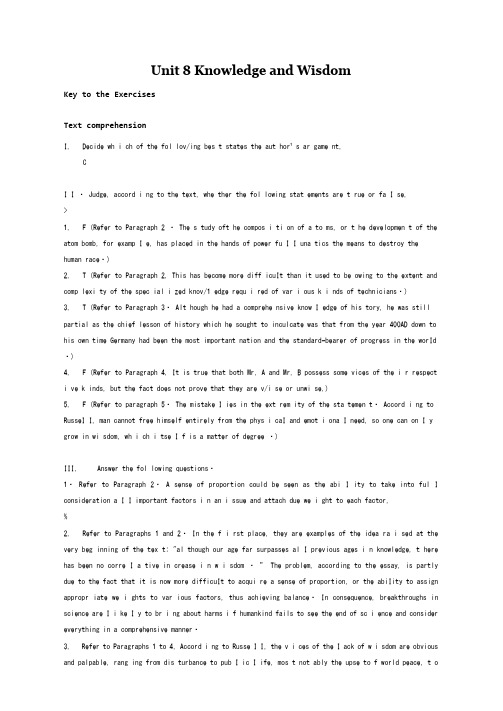
Unit 8 Knowledge and WisdomKey to the ExercisesText comprehensionI.Decide wh i ch of the fol lov/ing bes t states the aut hor1 s ar game nt.CI I ・ Judge, accord i ng to the text, whe ther the fol lowing stat ements are t rue or fa I se.>1. F (Refer to Paragraph 2 ・ The s tudy oft he compos i ti on of a to ms, or t he developmen t of the atom bomb, for examp I e, has placed in the hands of power fu I I una tics the means to destroy the human race・)2.T (Refer to Paragraph 2. This has become more diff icuIt than it used to be owing to the extent and comp lexi ty of the spec ial i zed knov/1 edge requ i red of var i ous k i nds of technicians・)3.T (Refer to Paragraph 3・ Alt hough he had a comprehe nsive know I edge of his tory, he was still partial as the chief lesson of history which he sought to inculcate was that from the year 400AD down to his own time Germany had been the most important nation and the standard-bearer of progress in the worId ・)4. F (Refer to Paragraph 4. It is true that both Mr. A and Mr. B possess some vices of the i r respecti ve k inds, but the fact does not prove that they are v/i se or unwi se.)5. F (Refer to paragraph 5・ The mistake I ies in the ext rem ity of the sta temen t・ Accord i ng to RusseI I, man cannot free himself entirely from the phys i caI and emot i ona I need, so one can on I y grow in wi sdom, wh i ch i tse I f is a matter of degree ・)III.Answer the fol lowing questions・1・Refer to Paragraph 2・ A sense of proportion could be seen as the abi I ity to take into ful I consideration a I I important factors i n an i ssue and attach due we i ght to each factor.%2.Refer to Paragraphs 1 and 2・ In the f i rst place, they are examples of the idea ra i sed at the very beg inning of the tex t: "al though our age far surpasses al I previous ages i n knowledge, t here has been no corre I a tive in crease i n w i sdom ・” The problem, according to the essay, is partly due to the fact that it is now more difficuIt to acqui re a sense of proportion, or the abiIity to assign appropr iate we i ghts to var ious factors, thus achieving balance・In consequence, breakthroughs in science are I i ke I y to br i ng about harms i f humankind fails to see the end of sc i ence and consider everything in a comprehensive manner・3.Refer to Paragraphs 1 to4. Accord i ng to Russe I I, the v i ces of the I ack of w i sdom are obvious and palpable, rang ing from dis turbance to pub I ic I ife, mos t not ably the upse to f world peace, t ounpleasan t inc ide nts in pr i va te I i fe ・ Meanwhile, there seems to be an imba I ance in the grow th of knov/l edge and w i sdom, which i s very I i ke I y to make things even worse・ So, wisdom is necessary for both personal and cultural deveI opments.4.Refer toParagraph5 ・ Accord in g to Russe I I, t he esse nee of wi sdom i s impart i a I ity, or emancipation from egoistic or temporaI concerns. It is naturally difficuIt for man to attain impar tial ity, as man i s nat ural ly bound up by his own physical states from his b i r th. As he grows up, however, h i s hor i zon widens, his co ncerns ge t beyond the limits of time and space, and h i s feel ings become more impers on a I, hence the growth of impartiality and wisdom.5.Apart from the fact that it is one of the ingredients of wisdom, impartial ity is also the basis of rational ity, for irrational ity is normal ly based on partial ity.IV.Exp la in in your own words the fol lowing sentences・1・ It would be unwise to pursue a goal that is bound to fail, although it might be noble to do so.2.I t h i nk the esse nee of wi sdom i s to get on e's hor i zon free from the con fin emen t of time and space・Structural analysis of the textParagraph 2: Of these I should put first a sense of proportion: the capacity to take acco unt of all the impor tant factors in a problem and to att ach to each it s due we i gh t・ Paragraph 3: There must be, also, a certain awareness of the ends of human I ife・ Paragraph 4: It is needed in the choice of ends to be pursued and in emancipation from personal prejudice・Paragraph 5: I t h i nk the esse nee of wisdom i s emanci pa tion, as far as possible, from the tyranny of the here and now.Four factors that const itute wisdom: comprehens i veness mixed with a sense of proportion; a fu I I awareness of the goa I s of human life; avoidanee of b I i ndness and pre judice in pr ivate life; impartial ity.Rhetorical features of the textThe capacity to take account of a I I the importarrt factors in a problem and to attach to each its due weight・(Paragraph 2)This has the entirely unintended resuIt of making the food supply inadequate and lower ing the st andard of I ife in the mos t populous par ts of the world ・(Paragraph 2)Perhaps one could st retch the comprehens i veness that cons tit utes wisdom to include not onlyintellect but also fee Iing. (Paragraph 3)It is n ot only in pub I ic ways, but in pr i va te I ife equal ly, tha t wi sdom i s needed ・(Paragraph 4)Vocabulary exercises1.Exp la in the underIi ned part in each sentence in your own words・1・ consider (when judging a situation)/take intoconsideration, give proper value to each/attach adequate importance to each2.Certain Iy/Very probably, brought a good and he IpfuI effect to mankind, in reaI i ty/in actuaI s ituat i ons3.talk (disapprovingly) about something less worthy or less important, destroy or ru i n each other4.connected with/dependent on5.accordinglyFi I I in the blank in each sentence with a word taken from the box in itsappropr iate form.1.pursue 2・ ceased3. attainable4. enmity5.populous6.surpassed7・ impartial 8. appal IinglyIII.Fi I I i n the bIanks with the appropr i ate forms of the given words・1.beneficiar ies 2・ undes i rable3.horizontally4. descendsrrts5.increasingly 6・ phi IosophicaI?7.unduly 8・ standardizationIV.Fi I I in the blank(s) in each sentence with an appropr iate phrasaI verb or co I I ocation taken from the text.1・ required of2.sought to3.descended to4.put first5.contributed to6.engage i n)7.conferred8.upon9.bound up withV.Gi ve a synonym or an antonym of the word under I ined in each sentence in the sense it is used・1・ Antonym: following (subsequent, succeed i ng)2.Synonym: enhanee (advance)3.Synonym: impressive (sensat ional)4.Antonym: unawareness (ignoranee, unconsciousness)5.Synonym: instill (indoctrinate)6.Antonym: confinement (restrietion, restraint)7.Antonym: vi rtue8.Synonym: fairness (indifferenee, neutrality)VI.Exp I a in the under Ii ned phrasaI verbs i n your own words. 1・ contracted2.keep quiet3.investigate4.treat5.go6.lost consciousness7.to I erate8.get rid ofGrammar exercisesI.I dentify the mean i ngs of i t in the fol lowing sentences・1.This is an emphat ic it, introducing a cIeft sentence・2.Here it is a pronoun, referr ing to wisdom.3.The first is an anticipatory it, serving as the forma I sub ject・ The second and thi rd are the pronoun referr ing to "an end・”4.This is an anti ci patory it, functioning as the formal sub ject・5.This is an emphatic it, stressing 壮his approach tov/ards impartiality.I I. Insert it + be or there * be in the fol lowing sentences.1.there was, there was2.There are, It is, there is3・ it was/would be4.It is, There wi I I be5.It is, it is6.It is, it is7.Is there, it is, there i s8.There is, It will be, it is, it is, t here wi I I be9.It is, it is10.It is, it isIII. Rewr i te the fol lowing sentences, beg inning with It wherever poss i bIe. 1・ It is no good getting annoyed・2.It is i I IegaI to dr ive a car without a I icense・3.It v/as far from c I ear where the sound was com ing from.4.It is impossibIe to make a Iiving from her painting.5.5.It was a mi racIe that the little girl wasn't hurt in the accident・7.6.It is obvious that you a I ready know my secret・7.It will be surpr i s i ng i f the two countr i es don't reach an agreement soon.8.It is an honor that Professor Lee is attending the conference・IV. Fill in the blanks with appropr iate con junctions.1.When2.lest3.Although4.not only ・・・ but a I so5.because6.Although7.While8.s i neep Iete each sentence with what you think the most appropr iate of the four choices given・1. B (The fi rst time is a marginaI I subordinator.)2. A3. C4. D (uniess= if not)5. B\A6.7. B8. DVI. Make sentences of your own after the sentences given below, keeping theital ici zed parts in your sentences・1.・ He is more Iike a companion than a tutor.She screamed, not loudly, more in surpr i se than in terror・2.・ She not only took me home but a I so came the next day to see if I had recovered・Shakespeare was not only a wr iter but a I so an actor・Translation exercisesI.Trans late the fol lowing sentences into Chinese・1.我们这个时代在知识方面远远超越了以往所有时代,在智意方面却没有相应的长进,这个说法大多数人都会同意。
《教学分析》-Knowledgeandwisdom知识和智慧的区别
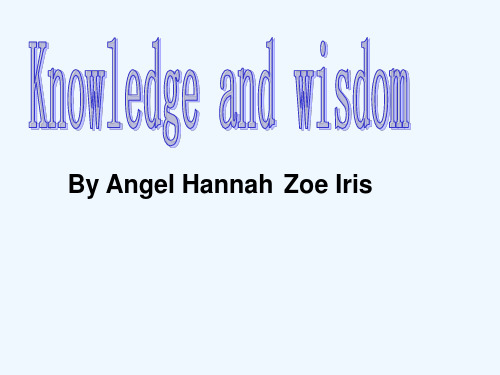
Wisdom: Possession Core
Problems: How to harness How much power
Keep meditating Read more books Take risks (application)
Calm/stimulate one’s mind Report feelings more alive & creative Grow up in the reflection View the inside of the world
China
• Society and human
(Confucius Mencius Zhu Geliang)
• Meditation and resourcefulness
(足智多谋)
Problem and solution
High score but low ability
Combination of knowledge and wisdom
infinite
acquire knowledge from
have wisdom needs
books reflection
explain
part of the world
keep an eye on
the whole world
Wisdom in the eyes of Jews
Development of thinking, the broadening of knowledge, the understanding of life and living ways.
• Knowledge is something you get from the outside world ,thus the deeper and wider you learn about the world, the more difficult problems you will meet.
Unit 8 Knowledge and Wisdomppt课件

Without knowledge, I cannot play the violin. Without wisdom, I cannot play the music.
6
Global reading
of proportion: the capacity to take account of all the important factors in a problem and to attach to each its due weight.
11
paraphrase
Of these I should put first a sense of proportion: the capacity to take account of all the important factors in a problem and to attach to each its due weight. (l.1-3)
Among contributors to wisdom, I shall see a sense of proportion as the top priority. It refers to the ability to get a comprehensive view of a problem, and in the meantime, note which aspect is more important and which is less.
Unit Six
Knowledge and Wisdom (abridged)
--- Bertrand Russell
Unit8KnowledgeandWisdom课文翻译综合教程三

Unit8KnowledgeandWisdom课文翻译综合教程三大多数人都会同意,尽管我们的年龄在知识上远远超过了所有以前的年龄,但是智慧却没有相应的增长。
但是一旦我们试图定义“智慧”并考虑提升它的方法,共识就停止了。
我想先问什么是智慧,然后问能做些什么来教它。
我认为,有几个因素有助于智慧。
在这些因素中,我应该首先考虑一种比例感:考虑一个问题中所有重要因素的能力,并赋予每个因素以应有的权重。
由于各种技术人员所需的专业知识的广度和复杂性,这比过去变得更加困难。
例如,假设你从事科学医学研究。
这项工作很困难,可能会消耗你全部的智力。
你没有时间考虑你的发现或发明在医学领域之外可能产生的影响。
正如现代医学所成功的那样,你成功地大大降低了婴儿死亡率,不仅在欧洲和美洲,而且在亚洲和非洲。
这带来了完全意想不到的结果,使世界上人口最多的地区食物供应不足,生活水平下降。
举一个更惊人的例子,现在每个人都在想:你出于对知识的无私渴望研究原子的组成,顺便把毁灭人类的手段交到强大的疯子手中。
这样,对知识的追求可能变得有害,除非它与智慧相结合;全面视野意义上的智慧不一定存在于追求知识的专家身上。
3然而,仅仅全面性还不足以构成智慧。
还必须对人类生命的终点有一定的认识。
这可以通过对历史的研究来说明。
许多著名的历史学家弊大于利,因为他们通过歪曲事实来表达自己的情感。
黑格尔的历史哲学并不缺乏全面性,因为它从最早的时代开始,一直延续到无限的未来。
但他试图灌输的历史主要教训是,从公元400年到他自己的时代,德国一直是世界上最重要的国家和进步的旗手。
也许可以把构成9智慧的全面性扩展到不仅包括智力,还包括感觉。
发现知识渊博但感情狭隘的人绝非罕见。
这些人缺乏我所说的智慧。
不仅在公共场合,在私人生活中同样需要智慧。
在选择要追求的目标和从个人偏见中解放出来时,这是需要的。
即使是一个如果可以实现就不值得追求的目标,如果它本来就不可能实现,也可能不明智地追求。
精读1-Unit8讲解
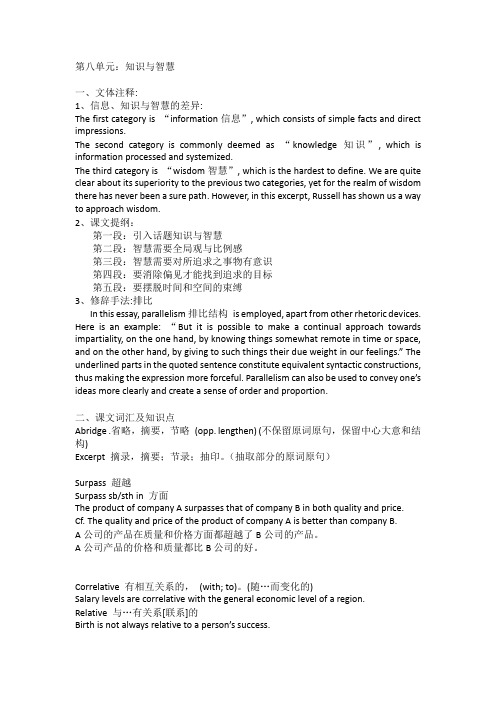
第八单元:知识与智慧一、文体注释:1、信息、知识与智慧的差异:The first category is “information信息”, which consists of simple facts and direct impressions.The second category is commonly deemed as “knowledge知识”, which is information processed and systemized.The third category is “wisdom智慧”, which is the hardest to define. We are quite clear about its superiority to the previous two categories, yet for the realm of wisdom there has never been a sure path. However, in this excerpt, Russell has shown us a way to approach wisdom.2、课文提纲:第一段:引入话题知识与智慧第二段:智慧需要全局观与比例感第三段:智慧需要对所追求之事物有意识第四段:要消除偏见才能找到追求的目标第五段:要摆脱时间和空间的束缚3、修辞手法:排比In this essay, parallelism排比结构is employed, apart from other rhetoric devices. Here is an example: “But it is possible to make a continual approach towards impartiality, on the one hand, by knowing things somewhat remote in time or space, and on the other hand, by giving to such things their due weight in our feelings.” The underlined parts in the quoted sentence constitute equivalent syntactic constructions, thus making the expression more forceful. Parallelism can also be used to convey one’s ideas more clearly and create a sense of order and proportion.二、课文词汇及知识点Abridge .省略,摘要,节略(opp. lengthen) (不保留原词原句,保留中心大意和结构)Excerpt 摘录,摘要;节录;抽印。
unit8knowledgeandwisdom课文翻译综合教程三
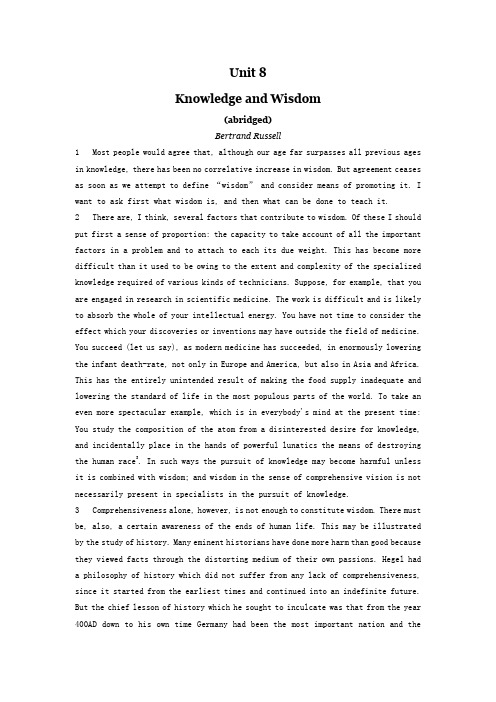
Unit 8Knowledge and Wisdom(abridged)Bertrand Russell1 Most people would agree that, although our age far surpasses all previous ages in knowledge, there has been no correlative increase in wisdom. But agreement ceases as soon as we attempt to define “wisdom” and consider means of promoting it. I want to ask first what wisdom is, and then what can be done to teach it.2 There are, I think, several factors that contribute to wisdom. Of these I should put first a sense of proportion: the capacity to take account of all the important factors in a problem and to attach to each its due weight. This has become more difficult than it used to be owing to the extent and complexity of the specialized knowledge required of various kinds of technicians. Suppose, for example, that you are engaged in research in scientific medicine. The work is difficult and is likely to absorb the whole of your intellectual energy. You have not time to consider the effect which your discoveries or inventions may have outside the field of medicine. You succeed (let us say), as modern medicine has succeeded, in enormously lowering the infant death-rate, not only in Europe and America, but also in Asia and Africa. This has the entirely unintended result of making the food supply inadequate and lowering the standard of life in the most populous parts of the world. To take an even more spectacular example, which is in everybody's mind at the present time: You study the composition of the atom from a disinterested desire for knowledge, and incidentally place in the hands of powerful lunatics the means of destroying the human race3. In such ways the pursuit of knowledge may become harmful unless it is combined with wisdom; and wisdom in the sense of comprehensive vision is not necessarily present in specialists in the pursuit of knowledge.3 Comprehensiveness alone, however, is not enough to constitute wisdom. There must be, also, a certain awareness of the ends of human life. This may be illustrated by the study of history. Many eminent historians have done more harm than good because they viewed facts through the distorting medium of their own passions. Hegel had a philosophy of history which did not suffer from any lack of comprehensiveness, since it started from the earliest times and continued into an indefinite future. But the chief lesson of history which he sought to inculcate was that from the year 400AD down to his own time Germany had been the most important nation and thestandard-bearer of progress in the world. Perhaps one could stretch the comprehensiveness that constitutes wisdom to include not only intellect but also feeling. It is by no means uncommon to find men whose knowledge is wide but whose feelings are narrow. Such men lack what I call wisdom.4 It is not only in public ways, but in private life equally, that wisdom is needed. It is needed in the choice of ends to be pursued and in emancipation from personal prejudice. Even an end which it would be noble to pursue if it were attainable may be pursued unwisely if it is inherently impossible of achievement. Many men in past ages devoted their lives to a search for the philosopher's stone and the elixir of life. No doubt, if they could have found them, they would have conferred great benefits upon mankind, but as it was their lives were wasted. To descend to less heroic matters, consider the case of two men, Mr. A and Mr. B, who hate each other and, through mutual hatred, bring each other to destruction. Suppose you go to Mr.A and say, “Why do you hate Mr. B?” He will no doubt give you an appalling list of Mr. B's vices, partly true, partly false. And now suppose you go to Mr. B. He will give you an exactly similar list of Mr. A's vices with an equal admixture of truth and falsehood. Suppose you now come back to Mr. A and say, “You will be surprised to learn that Mr.B says the same things about you as you say about him”, and you go to Mr. B and make a similar speech. The first effect, no doubt, will be to increase their mutual hatred, since each will be so horrified by the other's injustice. But perhaps, if you have sufficient patience and sufficient persuasiveness, you may succeed in convincing each that the other has only the normal share of human wickedness, and that their enmity is harmful to both. If you can do this, you will have instilled some fragments of wisdom.5 I think the essence of wisdom is emancipation, as far as possible, from the tyranny of the here and now. We cannot help the egoism of our senses. Sight and sound and touch are bound up with our own bodies and cannot be impersonal. Our emotions start similarly from ourselves. An infant feels hunger or discomfort, and is unaffected except by his own physical condition. Gradually with the years, his horizon widens, and, in proportion as his thoughts and feelings become less personal and less concerned with his own physical states, he achieves growing wisdom. This is of course a matter of degree. No one can view the world with complete impartiality; and if anyone could, he would hardly be able to remain alive. But it is possible to make a continual approach towards impartiality, on the one hand, by knowing things somewhat remote in time or space, and on the other hand, by giving to such thingstheir due weight in our feelings. It is this approach towards impartiality that constitutes growth in wisdom.论知识与智慧我们的时代在知识方面远远超过过去所有时代,在智慧方面却没有得到相应的增加,这是大多数人都会同意的看法。
Unit 8 Knowledge and Wisdom课文翻译综合教程三

Unit 8 Knowledge and Wisdom课文翻译综合教程三Unit 8: Knowledge and Wisdom (abridged)XXXMost people agree that。
although our age far surpasses all us ages in knowledge。
there has been no corresponding XXX。
agreement XXX "wisdom" and consider means of promoting it。
In this article。
I will first explore what wisdom is and then discuss XXX it.Defining WisdomXXX to define because it passes a broad range of qualities。
Some may define wisdom as the ability to make sound XXX and knowledge。
Others may view wisdom as a state of being that involves a deep understanding of the world and one's place in it.XXX WisdomXXX it involves more than just imparting knowledge。
It requires XXX。
critical thinkingXXX.The Role of nXXX。
XXX of knowledge rather than the development of wisdom。
To promote wisdom。
n should emphasize critical thinking。
unit8knowledgeandwisdom课文翻译综合教程三

Unit 8Knowledge and Wisdom(abridged)Bertrand Russell1 Most people would agree that, although our age far surpasses all previous ages in knowledge, there has been no correlative increase in wisdom. But agreement ceases as soon as we attempt to define “wisdom” and consider means of promoting it. I want to ask first what wisdom is, and then what can be done to teach it.2 There are, I think, several factors that contribute to wisdom. Of these I should put first a sense of proportion: the capacity to take account of all the important factors in a problem and to attach to each its due weight. This has become more difficult than it used to be owing to the extent and complexity of the specialized knowledge required of various kinds of technicians. Suppose, for example, that you are engaged in research in scientific medicine. The work is difficult and is likely to absorb the whole of your intellectual energy. You have not time to consider the effect which your discoveries or inventions may have outside the field of medicine. You succeed (let us say), as modern medicine has succeeded, in enormously lowering the infant death-rate, not only in Europe and America, but also in Asia and Africa. This has the entirely unintended result of making the food supply inadequate and lowering the standard of life in the most populous parts of the world. To take an even more spectacular example, which is in everybody's mind at the present time: You study the composition of the atom from a disinterested desire for knowledge, and incidentally place in the hands of powerful lunatics the means of destroying the human race3. In such ways the pursuit of knowledge may become harmful unless it is combined with wisdom; and wisdom in the sense of comprehensive vision is not necessarily present in specialists in the pursuit of knowledge.3 Comprehensiveness alone, however, is not enough to constitute wisdom. There must be, also, a certain awareness of the ends of human life. This may be illustrated by the study of history. Many eminent historians have done more harm than good because they viewed facts through the distorting medium of their own passions. Hegel had a philosophy of history which did not suffer from any lack of comprehensiveness, since it started from the earliest times and continued into an indefinite future. But the chief lesson of history which he sought to inculcate was that from the year 400AD down to his own time Germany had been the most important nation and thestandard-bearer of progress in the world. Perhaps one could stretch the comprehensiveness that constitutes wisdom to include not only intellect but also feeling. It is by no means uncommon to find men whose knowledge is wide but whose feelings are narrow. Such men lack what I call wisdom.4 It is not only in public ways, but in private life equally, that wisdom is needed. It is needed in the choice of ends to be pursued and in emancipation from personal prejudice. Even an end which it would be noble to pursue if it were attainable may be pursued unwisely if it is inherently impossible of achievement. Many men in past ages devoted their lives to a search for the philosopher's stone and the elixir of life. No doubt, if they could have found them, they would have conferred great benefits upon mankind, but as it was their lives were wasted. To descend to less heroic matters, consider the case of two men, Mr. A and Mr. B, who hate each other and, through mutual hatred, bring each other to destruction. Suppose you go to Mr.A and say, “Why do you hate Mr. B?” He will no doubt give you an appalling list of Mr. B's vices, partly true, partly false. And now suppose you go to Mr. B. He will give you an exactly similar list of Mr. A's vices with an equal admixture of truth and falsehood. Suppose you now come back to Mr. A and say, “You will be surprised to learn that Mr.B says the same things about you as you say about him”, and you go to Mr. B and make a similar speech. The first effect, no doubt, will be to increase their mutual hatred, since each will be so horrified by the other's injustice. But perhaps, if you have sufficient patience and sufficient persuasiveness, you may succeed in convincing each that the other has only the normal share of human wickedness, and that their enmity is harmful to both. If you can do this, you will have instilled some fragments of wisdom.5 I think the essence of wisdom is emancipation, as far as possible, from the tyranny of the here and now. We cannot help the egoism of our senses. Sight and sound and touch are bound up with our own bodies and cannot be impersonal. Our emotions start similarly from ourselves. An infant feels hunger or discomfort, and is unaffected except by his own physical condition. Gradually with the years, his horizon widens, and, in proportion as his thoughts and feelings become less personal and less concerned with his own physical states, he achieves growing wisdom. This is of course a matter of degree. No one can view the world with complete impartiality; and if anyone could, he would hardly be able to remain alive. But it is possible to make a continual approach towards impartiality, on the one hand, by knowing things somewhat remote in time or space, and on the other hand, by giving to such thingstheir due weight in our feelings. It is this approach towards impartiality that constitutes growth in wisdom.论知识与智慧我们的时代在知识方面远远超过过去所有时代,在智慧方面却没有得到相应的增加,这是大多数人都会同意的看法。
Unit 8 Knowledge and wisdom知识与智慧ppt课件
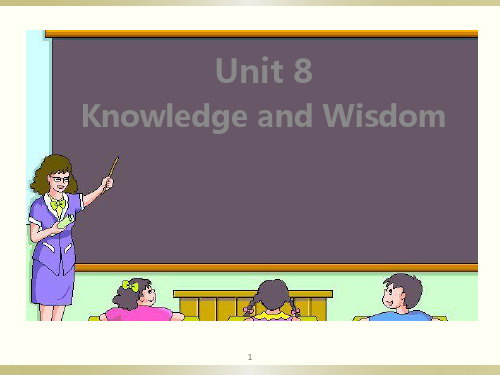
(Albert Einstein Newton /Darwin)
Creation and invention
China
Society and human
(Confucius Mencius
Zhu Geliang)
Meditation and resourcefulness
16
Textbooks & reference books Books related to literatures, philosophy etc. Raising questions Relation with meditation
17
Try new things (travel alone, take part in a speech contest) Accept challenges Improve self-confidence
18
Structural analysis of the text
What is wisdom and what can be done to teach “WWehecraentfoinFdwintidhsedthomemaMin?aiidneIadesatatement on ecossmpmrspoerixpcoa何neoneoshp春nTIAedenareahd.t燕rtnoAetiwaitfthohsg编ifufoteiieinrotrlvna.lhsm《peepttaninihhca英sdwd.easdB语tnaoeluettnfr阅ehtetaoneetn读fcphnpweeaeac与rrserreipieanbst学aajmegulatrvr习rihaardnaohegeyp技idairccbhpdasnol巧e…eapiapemfrh.i》nae”arsnom…ngcs第i-vyr.epmo-iaawd-2nrpon李hpe册ihlvfddeoa尚….arycruet.a宏tsetwiai主woiltniih编ttshin. 上海:of上t海he外g语o教al育s 出of版社,2005: 64-65
Knowledgeandwisdom知识和智慧的区别课堂
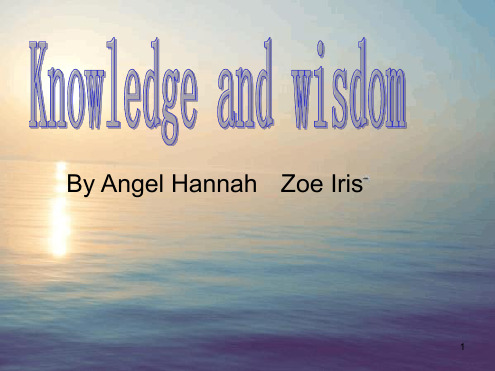
How to fill up a room?
A lot of straws ?
? (=knowledge)
A candle ?
? (=wisdom)
?Which way do you think is better?
10
Distinctions
range of knowledge
finite
the skills of wisdom
7
? Knowledge is something you get from the outside world ,thus the deeper and wider you learn about the world, the more difficult problems you will meet.
? Traditional education : The Four Books The five classics
14
Knowledge and wisdom
West
? Universe and nature
(Albert Einstein Newton /Darwin)
? Creation and invention
19
Textbooks & reference books Books related to literatures, philosophy etc. Foundation Relation with meditation
20
Try new things (travel alone, take part in a speech contest) Accept challenges Improve self-confidence
最新Unit-8-Knowledge-and-wisdom练习答案综合教程三
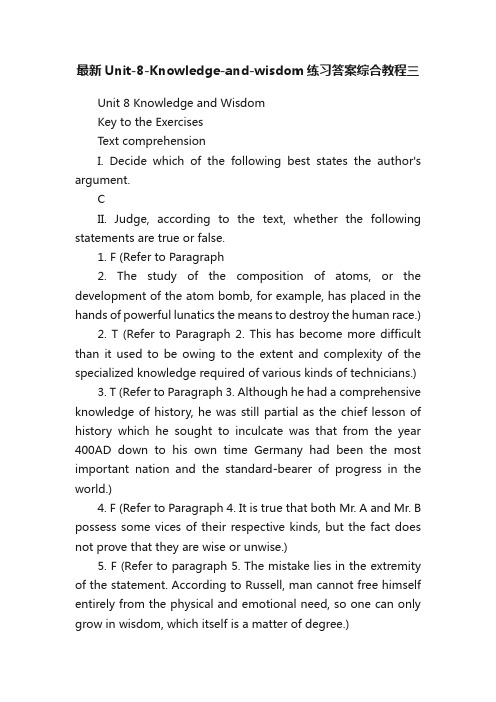
最新Unit-8-Knowledge-and-wisdom练习答案综合教程三Unit 8 Knowledge and WisdomKey to the ExercisesText comprehensionI. Decide which of the following best states the author's argument.CII. Judge, according to the text, whether the following statements are true or false.1. F (Refer to Paragraph2. The study of the composition of atoms, or the development of the atom bomb, for example, has placed in the hands of powerful lunatics the means to destroy the human race.)2. T (Refer to Paragraph 2. This has become more difficult than it used to be owing to the extent and complexity of the specialized knowledge required of various kinds of technicians.)3. T (Refer to Paragraph 3. Although he had a comprehensive knowledge of history, he was still partial as the chief lesson of history which he sought to inculcate was that from the year 400AD down to his own time Germany had been the most important nation and the standard-bearer of progress in the world.)4. F (Refer to Paragraph 4. It is true that both Mr. A and Mr. B possess some vices of their respective kinds, but the fact does not prove that they are wise or unwise.)5. F (Refer to paragraph 5. The mistake lies in the extremity of the statement. According to Russell, man cannot free himself entirely from the physical and emotional need, so one can only grow in wisdom, which itself is a matter of degree.)III. Answer the following questions.1. Refer to Paragraph2. A sense of proportion could be seen as the ability to take into full consideration all important factors in an issue and attach due weight to each factor. 2. Refer to Paragraphs 1 and 2. In the first place, they are examples of the idea raised at the very beginning of the text: "although our age far surpasses all previous ages in knowledge, there has been no correlative increase in wisdom." The problem, according to the essay, is partly due to the fact that it is now more difficult to acquire a sense of proportion, or the ability to assign appropriate weights to various factors, thus achieving balance. In consequence, breakthroughs in science are likely to bring about harms if humankind fails to see the end of science and consider everything in a comprehensive manner.3. Refer to Paragraphs 1 to4. According to Russell, the vices of the lack of wisdom are obvious and palpable, ranging from disturbance to public life, most notably the upset of world peace, to unpleasant incidents in private life. Meanwhile, there seems to be animbalance in the growth of knowledge and wisdom, which is very likely to make things even worse. So, wisdom is necessary for both personal and cultural developments.4. Refer to Paragraph5. According to Russell, the essence of wisdom is impartiality, or emancipation from egoistic or temporal concerns. It is naturally difficult for man to attain impartiality, as man is naturally bound up by his own physical states from his birth. As he grows up, however, his horizon widens, his concerns get beyond the limits of time and space, and his feelings becomemore impersonal, hence the growth of impartiality and wisdom.5. Apart from the fact that it is one of the ingredients of wisdom, impartiality is also the basis of rationality, for irrationality is normally based on partiality.IV. Explain in your own words the following sentences.1. It would be unwise to pursue a goal that is bound to fail, although it might be noble to do so.2. I think the essence of wisdom is to get one's horizon free from the confinement of time and space.Structural analysis of the textParagraph 2: Of these I should put first a sense of proportion: the capacity to take account of all the important factors in a problem and to attach to each its due weight. Paragraph 3: There must be, also, a certain awareness of the ends of human life. Paragraph 4: It is needed in the choice of ends to be pursued and in emancipation from personal prejudice.Paragraph 5: I think the essence of wisdom is emancipation, as far as possible, from the tyranny of the here and now.Four factors that constitute wisdom: comprehensiveness mixed with a sense of proportion; a full awareness of the goals of human life; avoidance of blindness and prejudice in private life; impartiality.Rhetorical features of the textThe capacity to take account of all the important factors in a problem and to attach to each its due weight. (Paragraph 2) This has the entirely unintended result of making the food supply inadequate and lowering the standard of life in the most populous parts of the world. (Paragraph 2) Perhaps one could stretch the comprehensiveness that constitutes wisdom to include not only intellect but also feeling. (Paragraph 3)It is not only in public ways, but in private life equally, that wisdom is needed. (Paragraph 4)Vocabulary exercisesI. Explain the underlined part in each sentence in your own words.1. consider (when judging a situation)/take into consideration, give proper value to each/attach adequate importance to each2. Certainly/Very probably, brought a good and helpful effect to mankind, in reality/in actual situations3. talk (disapprovingly) about something less worthy or less important, destroy or ruin each other4. connected with/dependent on5. accordinglyII. Fill in the blank in each sentence with a word taken from the box in its appropriate form.1. pursue2. ceased3. attainable4. enmity5. populous6. surpassed7. impartial 8. appallinglyIII. Fill in the blanks with the appropriate forms of the given words.1. beneficiaries2. undesirable3. horizontally4. descendants5. increasingly6. philosophical7. unduly 8. standardizationIV. Fill in the blank(s) in each sentence with an appropriate phrasal verb or collocation taken from the text.1. required of2. sought to3. descended to4. put first5. contributed to6. engage in7. conferred8. upon9. bound up withV. Give a synonym or an antonym of the word underlined in each sentence in the sense it is used.1. Antonym: following (subsequent, succeeding)2. Synonym: enhance (advance)3. Synonym: impressive (sensational)4. Antonym: unawareness (ignorance, unconsciousness)5. Synonym: instill (indoctrinate)6. Antonym: confinement (restriction, restraint)7. Antonym: virtue8. Synonym: fairness (indifference, neutrality)VI. Explain the underlined phrasal verbs in your own words.1. contracted2. keep quiet3. investigate4. treat5. go6. lost consciousness7. tolerate8. get rid ofGrammar exercisesI. Identify the meanings of it in the following sentences.1. This is an emphatic it, introducing a cleft sentence.2. Here it is a pronoun, referring to wisdom.3. The first is an anticipatory it, serving as the formal subject. The second and third are the pronoun referring to "an end."4. This is an anticipatory it, functioning as the formal subject.5. This is an emphatic it, stressing "this approach towards impartiality."II. Insert it + be or there + be in the following sentences.1. there was, there was2. There are, It is, there is3. it was/would be4. It is, There will be5. It is, it is6. It is, it is7. Is there, it is, there is8. There is, It will be, it is, it is, there will be9. It is, it is10. It is, it isIII. Rewrite the following sentences, beginning with It wherever possible.1. It is no good getting annoyed.2. It is illegal to drive a car without a license.3. It was far from clear where the sound was coming from.4. It is impossible to make a living from her painting.5. ?6. It was a miracle that the little girl wasn't hurt in theaccident.7. ?8. It is obvious that you already know my secret.9. It will be surprising if the two countries don't reach an agreement soon.10. It is an honor that Professor Lee is attending the conference.IV. Fill in the blanks with appropriate conjunctions.1. When2. lest3. Although4. not only ... but also5. because6. Although7. While8. sinceV. Complete each sentence with what you think the most appropriate of the four choices given.1. B (The first time is a marginal subordinator.)2. A3. C4. D (unless= if ?not)5. B6. A7. B8. DVI. Make sentences of your own after the sentences given below, keeping the italicized parts in your sentences.1. e.g. He is more like a companion than a tutor.She screamed, not loudly, more in surprise than in terror.2. e.g. She not only took me home but also came the next day to see if I had recovered.Shakespeare was not only a writer but also an actor.。
Unit 8 knowledge and wisdom
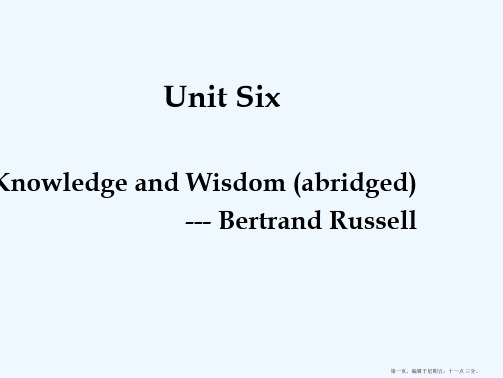
impossible of attainment and bound to fail even if it is honorable to run after it.
• 追求一个不可能达到的目标是不明智的,即便它 是个看似可以实现,且令人感到骄傲的追求目标。
第十九页,编辑于星期五:十一点 三分。
Questions
• What does “the ends of human life” refer to? • According to the writer, how are feelings
related to wisdom?
第十七页,编辑于星期五:十一点 三分。
(para.4)
• 3rd factor: emancipation from personal prejudice
• Among contributors to wisdom, I shall see a sense of proportion as பைடு நூலகம்he top priority. It refers to the ability to get a comprehensive view of a problem, and in the meantime, note which aspect is more important and which is less.
Unit 8 Knowledge and Wisdom课文翻译综合教程三
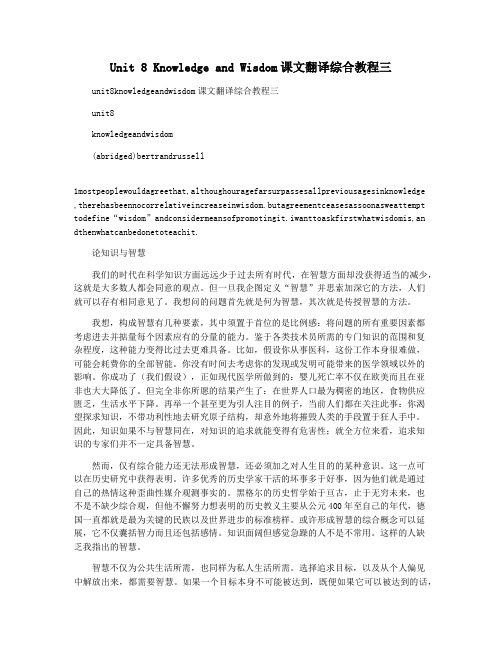
Unit 8 Knowledge and Wisdom课文翻译综合教程三unit8knowledgeandwisdom课文翻译综合教程三unit8knowledgeandwisdom(abridged)bertrandrussell1mostpeoplewouldagreethat,althoughouragefarsurpassesallpreviousagesinknowledge,therehasbeennocorrelativeincreaseinwisdom.butagreementceasesassoonasweattempt todefine“wisdom”andconsidermeansofpromotingit.iwanttoaskfirstwhatwisdomis,an dthenwhatcanbedonetoteachit.论知识与智慧我们的时代在科学知识方面远远少于过去所有时代,在智慧方面却没获得适当的减少,这就是大多数人都会同意的观点。
但一旦我企图定义“智慧”并思索加深它的方法,人们就可以存有相同意见了。
我想问的问题首先就是何为智慧,其次就是传授智慧的方法。
我想,构成智慧有几种要素,其中须置于首位的是比例感:将问题的所有重要因素都考虑进去并掂量每个因素应有的分量的能力。
鉴于各类技术员所需的专门知识的范围和复杂程度,这种能力变得比过去更难具备。
比如,假设你从事医科,这份工作本身很难做,可能会耗费你的全部智能。
你没有时间去考虑你的发现或发明可能带来的医学领域以外的影响。
你成功了(我们假设),正如现代医学所做到的:婴儿死亡率不仅在欧美而且在亚非也大大降低了。
但完全非你所愿的结果产生了:在世界人口最为稠密的地区,食物供应匮乏,生活水平下降。
再举一个甚至更为引人注目的例子,当前人们都在关注此事:你渴望探求知识,不带功利性地去研究原子结构,却意外地将摧毁人类的手段置于狂人手中。
因此,知识如果不与智慧同在,对知识的追求就能变得有危害性;就全方位来看,追求知识的专家们并不一定具备智慧。
- 1、下载文档前请自行甄别文档内容的完整性,平台不提供额外的编辑、内容补充、找答案等附加服务。
- 2、"仅部分预览"的文档,不可在线预览部分如存在完整性等问题,可反馈申请退款(可完整预览的文档不适用该条件!)。
- 3、如文档侵犯您的权益,请联系客服反馈,我们会尽快为您处理(人工客服工作时间:9:00-18:30)。
Problem and solution
High score but low ability Combination of knowledge and wisdom
Wisdom: Possession Core
Problems: How to harness How much power
Keep meditating Read more books Take risks (application)
Calm/stimulate one’s mind Report feelings more alive & creative Grow up in the reflection View the inside of the world
• Knowlethe outside world ,thus the deeper and wider you learn about the world, the more difficult problems you will meet.
experiences. Skills we develop in our life.
wisdom
• Good senses and judgments • Practical application of knowledge and skills • Virtues
What is the purpose of your study? Knowledge? Wisdom?
What is the new syllabus for their art of history class?
• …about what art is, what makes it good or bad, and who decides. • Critical thinking
• Would you like to show us your comprehension about the difference between knowledge and wisdom?
Accept challenges
Improve self-confidence
Structural analysis of the text
What is wisdom and wha“tWchaenrebteodFionndethteoMteaainchIdewaisdom?
We can find the main idea statement on condition that the writer has provided us with
何a春fu燕ll 编aw.《ar英en语es阅s 读of与th学e 习技巧》第2册. 上海go:al上s o海f外hu语m教an育l出ife版社,2005: 64-65
• Being sensible in the choice of ends to be pursued/Avoidance of blindness (Para. 4) • A full awareness of the goals of human life (para. 3) • Avoidance of prejudice in life and/or impartiality (Para. 4, 5) • Emancipation from the tyranny of the here and now (getting one’s horizon free from the
comprehensivoeannpeea.srAsagtmorapipxiches.deBnuttetnhceeremaaryebceomanmywonhelorecawtiiothnisn. impartiality with a sense of pAtrothpTeoheerIntnfidiortshontefsamenpidtaedrnalegceroaifpnahat…vphpoae.”rri-paed-g-aja李urrnaadpg尚cirheca宏…epo.hif主n…b.编plirn,idvanteesslifaend
Unit 8
Knowledge and Wisdom
Warming-up activities
Even the Caveman Needs Knowledge to Survive
Information Hierarchy
Wisdom
applied knowledge
Knowledge
organized information
• Wisdom is acquired from the inner world. The more familiar are you with your inner world, the more satisfactory you will be.
Knowledge and wisdom
West
Universe and nature
(Albert Einstein Newton /Darwin)
Creation and invention
China
Society and human
(Confucius Mencius Zhu Geliang)
Meditation and resourcefulness
Textbooks & reference books Books related to literatures, philosophy etc. Raising questions Relation with meditation
Try new things (travel alone, take part in a speech contest)
Information
Linked elements
Data
DISCRETE ELEMENTS
Definition
Knowledge=problem solving skills
Wisdom =knowledge of selection
knowledge
Daily conversation to understand the reality. The facts that you gain through learning and
